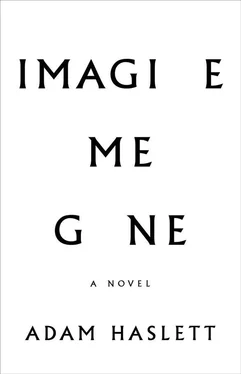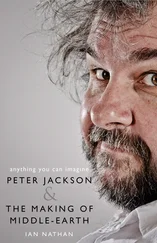And with that, she shrugs, as if to say, C’est la vie .
When the waiter appears to check on us, she puts her hand on his forearm and says, “Be a darling, won’t you, this Sancerre is just delicious.”
I was hungry when I sat down, but I’m not anymore. “The fact is,” I say, “I don’t need that whole house, and if we moved closer in it would be easier to get to things. And better than shouting with Alec about money, and Alec shouting at Michael, which is all some families do.”
“You’re a good mother,” she says. “Better than mine ever was. You’re devoted to those kids.”
“I’m not sure they see it that way.”
“They should. Are you kidding? You could have been a train wreck, and who would have blamed you?”
Despite my protest, she won’t let me split the bill. I’m still trying to give her cash as we walk back onto Dartmouth, where the wind has picked up.
“Don’t give me any money,” she says. “Just shop with me for a bit.”
I can hardly decline, and it will give Michael longer before I go looking for him. I have to fight off her suggestions for a half dozen dresses and little bits of jewelry, after which she finally settles down and shops for herself. When we eventually say good-bye at her car, she makes me swear she hasn’t been a bore, and that we’ll do it again.
“About all that other stuff, I always thought your house was a little drab,” she says, displaying her usual tact, her mouth still loose with wine. I shouldn’t be letting her drive. “So don’t worry about it. You’ll do the right thing.”
Leaves rain down across the wide path that stretches along the middle of Commonwealth Avenue. I pass women with strollers, and joggers out in the fine fall weather. Whenever it was pleasant out, this is where I came to read while John had his appointments with Dr. Gregory on Marlborough Street. In the cold or the rain, I would stay in the car, and wait. For someone else, besides me, to tell him that things couldn’t go on the way they were.
I ran into him once, Dr. Gregory. At the cinema with his wife, a few months after John died. I wanted to hurt him. But we shook hands and he asked politely how I had been. It wasn’t until much later that Michael began seeing him. I imagine he’s still there, in that grand office of his.
When I reach Mass. Ave., I turn left, looking for the door that opens onto the staircase to the little record shop. I’ve been here once but forget which entryway it is. Up the block is the Virgin Store at the top of Newbury, and there in front of it, to my surprise, is Michael. He’s standing on the corner, his messenger bag slung over his shoulder, handing out flyers to the people rushing by. He holds the papers out, forcing them to decline before passing. As if he’s been paid to advertise some suit sale, or attract converts to a religious cult. The sight of it makes me flinch. Something is the matter. He’s become confused somehow, unmoored.
I’m less than half a block away but still he hasn’t seen me. I start walking toward him, to help him out of whatever trouble this is, and then I remember the pamphlets — the ones he keeps in his bag, with the picture of the black farmer tilling a field. That’s what he’s doing. He is handing out his pamphlets on reparations. Little booklets on the history of the slave trade for these Saturday-afternoon shoppers, who think they’re being offered coupons and freely ignore him.
He’s smiling as he does it, at each person, trying to establish a second of rapport. It’s that deliberate, nodding politeness of his, apologizing for the inconvenience he’s putting them through while imposing himself nonetheless.
I can’t move. I want to stop him, to save him from being judged a kook, reduced to proselytizing on a street corner. But I’m the last person he wants to see. To be embarrassed by his mother fretting over him in public would only make it worse. I’m about to go, but he’s seen me now and appears frozen, his hands down at his sides, his smile suddenly gone. He looks fixedly at me, as if suddenly there were no one on the street but the two of us. I must not cry. It isn’t fair to him. I wave, and smile, and call out, “I’ll see you later, then, I’m off,” and I turn my back to him and retreat up the block.
Later, in the evening, after he has returned, the rain comes. It begins as a shower but soon the skies open and the drops drum fast against the roof and slap the windowpanes. I hurry around closing windows before the sills get soaked. Warm air floats through the screens of the vestibule and the back porch on this October night, as if carried in by a belated summer thunderstorm, one of those that never delivered its moisture back in August. On the dry ground, the water will run straight to the gutters, wasted. We need a soak, not a torrent. Twenty minutes later it is gone, swept away to the east, and there is only the sound of dripping branches, and the dark shining in the porch light.
One of the cable channels is showing The Philadelphia Story, which I haven’t seen in years. I ask Michael if he’d like to watch it with me but he declines, saying he’s going to head upstairs. It is such a pleasure of a movie, so stylish and light. You can’t help but cheer for the drunken Cary Grant to get Hepburn back. They are meant for each other. I watch a bit, then a bit more, and soon it has carried me off into its gentle absurdity. It’s already midnight when it ends. On my way to bed, I see Michael’s light on under his door. Best to leave him be, I think, which is what I do, walking past without saying good night, in case he’s fallen asleep reading.
It’s in the small hours of the morning that I’m startled awake by a knocking at my door, and then the door opens and Michael stands there silhouetted by the sudden glare of the hall bulb.
“What is it, what is it?”
“I can’t breathe,” he says. “I’m suffocating.”
My bedside lamp reveals a look of pure terror on his face. He comes to the foot of my bed, clutching his chest.
“Are you choking?”
“No, no, I just can’t breathe, I can’t breathe.”
“Well, sit down,” I tell him. Which he does, perching by my legs, his whole torso heaving. “Is it the asthma? Do you have your inhaler?”
“I’m not wheezing. I have to go to the hospital, you have to call an ambulance.”
I get out of bed and put on my bathrobe. “It’s all right,” I say. “You’re having an attack, isn’t that right? You’re worried. It’s okay. Just keep breathing. Did you have a bath? I can run you a bath.”
“No!” he says. “You have to call an ambulance.”
“Michael! Come on now. You need to calm down. We’re not calling an ambulance in the middle of the night. We can try Dr. Bennet in the morning. You’re not going to the hospital.”
He stares at me as if I’m casting him adrift in a storm. But what in God’s name am I supposed to do? Drive him through the night? Or have sirens and lights in front of the house at four in the morning?
“There must be one of those pills that makes you sleep, surely. I can get it for you.”
He shakes his head, as desperate and miserable as I have ever seen him.
“Come here,” I say, sitting next to him on the bed, trying to hug him, though his body is stiff as a board.
“You’re not going to help?” he asks.
“I’m not saying that. Stand up. We’re going downstairs.”
He follows me down into the kitchen. I turn on the lights, and fill the kettle, and get out the lemon and the honey, and from the cabinet in the dining room I fetch the Scotch that I never drink.
“I’m being crushed,” he says.
I take a mug from the shelf above the sink, and make up the hot toddy.
Читать дальше












